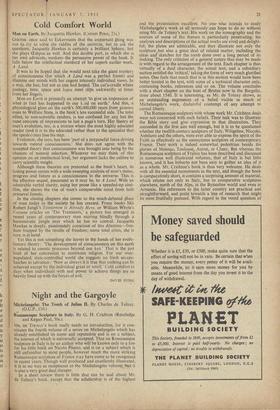Cold Comfort World
Man on Earth. By Jacquetta Hawkes. (Cresset Press. 21s.) GOETHE once said to Eckermann that the important thing was not to . try to solve the riddles of the universe, but to ask the questions. Jacquetta Hawkes is certainly a brilliant Sphinx; but she plays tidipus as well. And this double part, in which she is her own advocate, weakens the persuasive power of the book. It falls below the intellectual standard of her superb earlier work, A Land.
It was to be hoped that she would next take the giant mystery of consciousness (for which A Land was a perfect frame) and illumine our minds with her cogent intensely individual views. In a way, she has; but not as one had hoped. The cat's-cradle where zoology, time, space and logos meet slips awkwardly at times from her fingers.
Man on Earth is primarily an attempt 'to give an impression of what in fact has happened to our k.nd on earth.' And this, a physiological gloss on the earth's 500,000,000 years from gaseous mass to Welfare State, is the book's less successful side. The total effect, to non-scientific readers, is too confused for any but the most concrete of impressions to last a page's turn. Her theory of man's evolution, too, is a morass where the most highly educated reader (and it is to the educated rather than to the specialist that she speaks) may lose his step.
Evolution, she says, has been 'part of a purposeful force driving towards mental consciousness.' She does not agree with the accepted theory that consciousness was brought into being by the chances of natural selection. Whatever we may think of this opinion on an intellectual level, her argument lacks the calibre to carry scientific weight.
Although these theories are presented as the book's heart, its lasting power comes with a wide-sweeping analysis of man's status, progress and future as a consciousness in the universe. This is. the effective sequel, piecemeal as it may be. to A Land. With an admirable verbal clarity, using her prose like a speeded-up cind- tilm, she shows the rise of man's conquerable mind from lush primeval forests. '
In the closing chapters she comes to the much-debated place of man today in the society he has created. From books lik-e Robert Jungk's Tomorrow is Already Here, or William Whyte's Fortune articles on 'The Transients,' a picture has emerged in recent years of contemporary man moving blindly through a bureaucratic jungle over which he has no control. Jacquetta Hawkes is deeply, passionately conscious of this dilemma—free- dom trapped by the results of freedom; some total crisis, she is sure, is at hand.
Yet this is not something she leaves in the hands of her evolu- tionary theory: 'The development of consciousness on this earth is related to cosmic processes beyond our ken.' That is the just limit of her concession to numinous religion. For our over- populated, state-controlled world she suggests no fresh escape- hatches to salvation : 'Now as always it is true that nothing can be achieved except by the individual great or small.' ('old comfort in days when individuals with real power to achieve things are so heavily lined up with the forces of evil.
DAVID STONE.














































 Previous page
Previous page